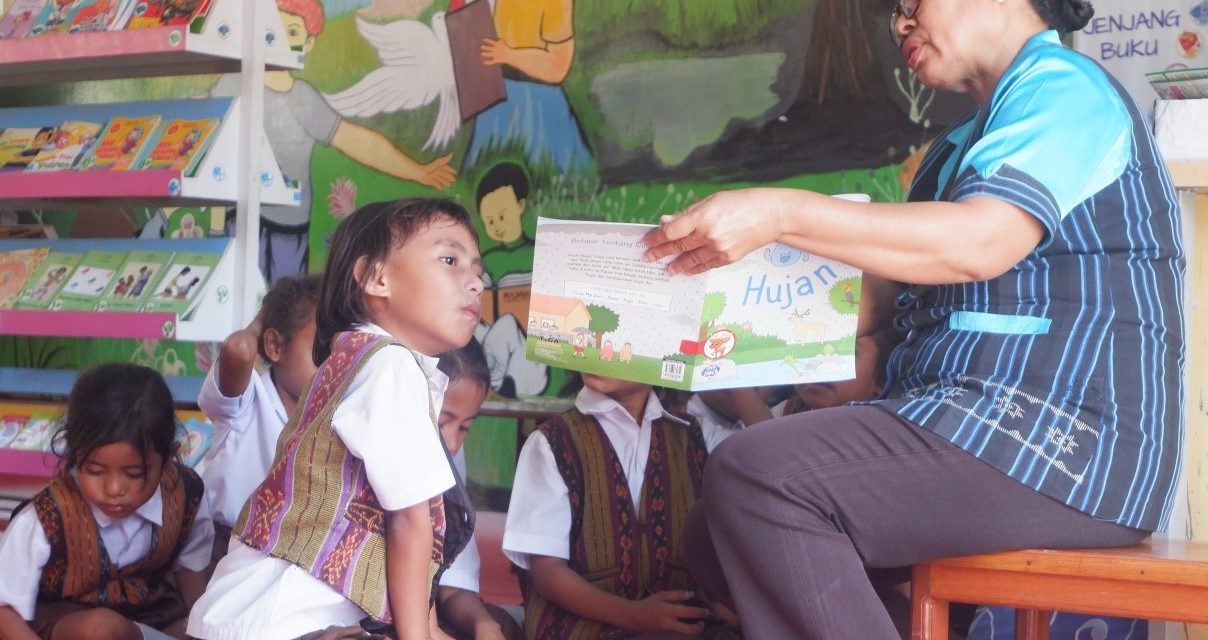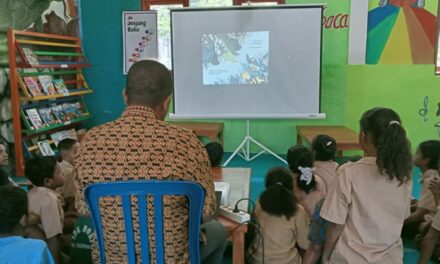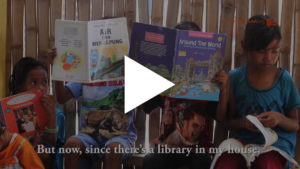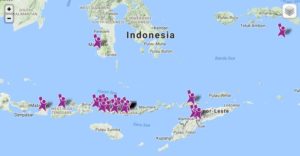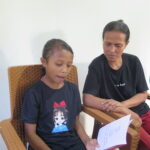How time flies! The first mentoring period of the literacy program held by Rainbow Reading Gardens has come to an end. My valuable two-month experience in Ende as an education evaluator to work closely with the first-grade teachers and principals from the five out of ten schools in the program has made me reflect on what it really takes to be a good teacher and what it means to be a teacher in provincial Indonesia.
So this is my take on teacher dynamics in the schools I observed.
Our idea about teachers is often romanticised. There is a set of expectations, obligations and responsibilities we automatically put on a teacher’s shoulder the moment we talk about improving learning. School principals want their teachers to make sure that their students perform well in exams, fulfill an abundance of administrative work and behave their best at all times; parents want them to make their children achieve academically and have certain sorts of behaviour considered as ‘the good kid’ characteristics; government expects them to improve their teaching quality by following a number of obligatory teaching training sessions, and boost their students’ academic performance; and this list goes on.
Teacher identity
What we often forget is the fact that those ’ideal’ teachers in our mind are not programmable robots that can be commanded as we like, or superheroes that can tackle impossible tasks all at once without any emotional fluctuation. They have their opinions, concern, aspiration, ambition and struggle both in their personal and professional contexts. All of these, along with their upbringing, educational and socio-cultural background shape their ways of identifying themselves as a teacher. I believe this becomes part of ‘the teacher identity’ that determines the kinds of teachers they would like to be and the types of relationship they would like to build with their students.
In the school around Ende that I visited regularly in the past two months, the teachers who seemed to have an incredibly warm relationship with their students often identified themselves as a ‘mother’ to the children in their class, so they felt that they were responsible for teaching the young ones effectively and lovingly. This was shown by how they reacted to their children when they made mistakes or not fulfilled the tasks in class. They generally tried their best to understand their students and provide the kind support the students needed in learning and use more gentle approaches in dealing with them. Adversely, those who embrace negative reinforcement in harshly disciplining their kids in class seemed to ‘position’ themselves as the ‘ruler’ of the class, so their relationship with their students felt more rigid, top-down and rather tense. I believe that the kind of identity teachers associate themselves with is somehow related to what I normally refer to as teacher agency.
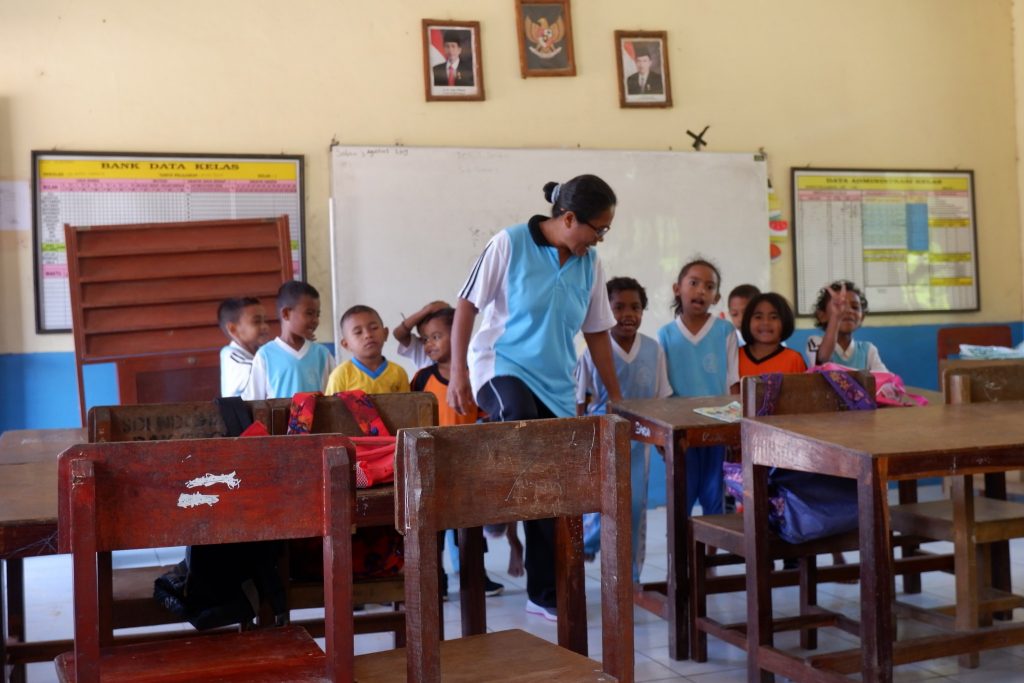
Teacher agency
The agency here has got to do with teachers’ ability to purposefully determine or change the directions of their actions as a teacher. Having observed the teachers in the five state schools I mentored, I found that some teachers tended to take control of what they would like to achieve in their classes, and some others did not, regardless of their age and socio-economic background. Those who showed this high-level agency seemed to have a strong take on their position as a teacher. They often talked to me about their ideas and concern on the improvement of their students, and they seemed to be sure about the ‘kind’ of teacher role they would like to embrace to help their students achieve what they wanted academically. This was usually followed by the way these teachers responded to change. When the literacy program was introduced by Reading Rainbow Gardens, they actively participated in the training session and showed real effort to help their students learn more effectively by preparing their lessons well before they came to class, for example.
Teacher reflection
At school, I learnt that teachers were rarely given a chance to reflect on the two important aspects above. Having been through a tough time with the kids in their classroom, for example, they often went home with their frustration unacknowledged. Then the next day this could repeat and eventually pile up and be ready to explode. Before they realised what had really been going on, sometimes their principal came along nagging them to submit the class paper work before the school supervisor came to visit. In this way, going to school could be such an intimidating experience for both teachers and eventually students.
We may think the amount of teachers’ burden should not be an excuse for not preparing lessons, physically punishing children for their ‘bad’ behaviours and not wanting to change the way they teach their classes. The burden is often seen as irrelevant. No matter how terrible the struggle a teacher has, he/she is still expected to do a perfect job as an ‘academic accelerator’, and in some societies, even as a ‘moral compass’. I would like to believe that this expectation makes a perfect sense, but let’s face it, not all school teachers in Indonesia have passion for teaching. Some of them ended up being a teacher because they thought it would be economically benefitting to be a civil servant. Therefore, becoming a teacher is seen as nothing more than just an easy shortcut to being financially secure.
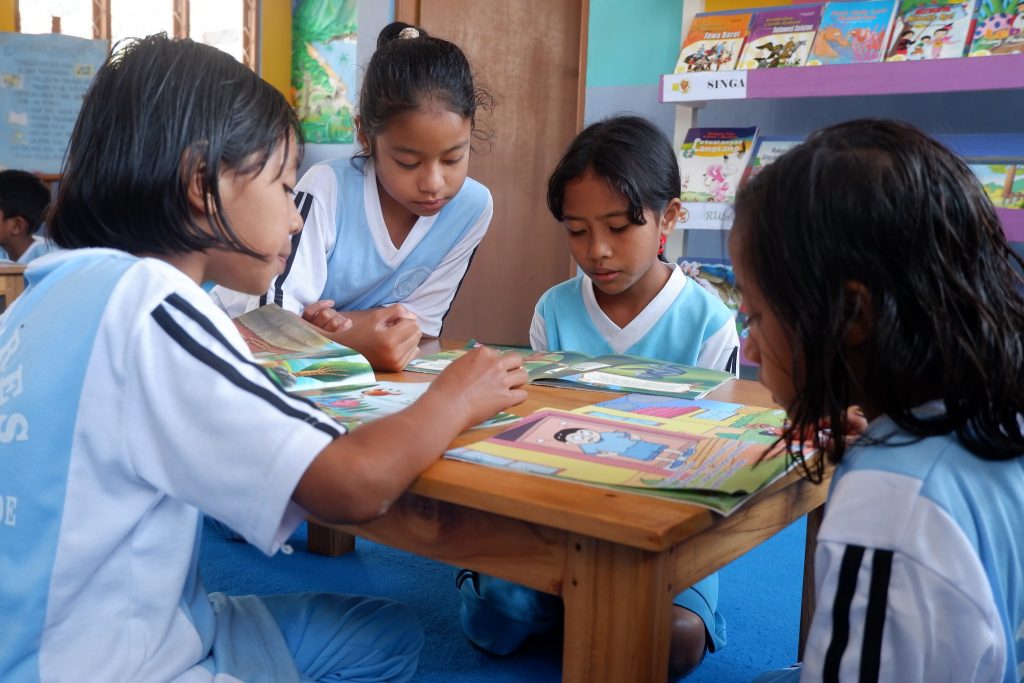
This issue could make them reluctant to initiate change in improving their ways of teaching to become more student-oriented. That is why I really think that school principals need to facilitate their teachers to regularly reflect on how they perceive their role as a teacher, what kind of change they would like to see in their teaching, how they are going to achieve it and how they see their relationship with the children they teach. At the end of the day, change won’t happen if teachers do not really see the point of it.
I then realised that my experience meeting all sorts of teachers in provincial Indonesia has made me come to a conclusion that the question ‘what does it mean to be a teacher?’ is as crucial as any new teaching methodology introduced as educational interventions to improve teacher quality. Perhaps, it’s the kind of question I would want to raise at the start of my future teacher training sessions.
Ende, Sept 5th 2019
Krisna Widitya Putri
![Taman Bacaan Pelangi [Rainbow Reading Gardens]](/wp-content/uploads/2016/07/logo_taman_bacaan_pelangi_rainbow_reading_gardens_bilingual_d.png)
